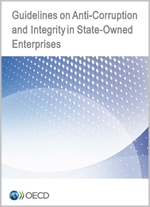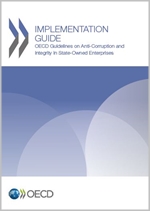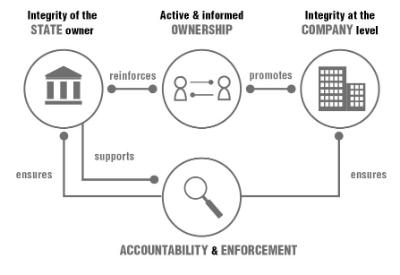Corporate governance
Anti-Corruption and Integrity in State-Owned Enterprises
What is the issue? |
|||||||||||||||||||
|
State-owned enterprises (SOEs) are a main conduit for states to exercise their roles as economic actors. The benefits of SOE ownership are economic, political and social. So too are the costs when mismanagement or abuse occurs. SOEs today account for 22% of the world’s largest companies and their role as global competitors is growing as the boundaries of markets increasingly extend beyond geographic borders. They are often concentrated in sectors with strategic importance for the state and society and are increasingly operated like private firms. The more pronounced presence of SOEs in the global marketplace has been marked by certain high-profile scandals and occasional evidence of susceptibility of SOEs to corruption. This raises questions about what might make SOEs susceptible to corruption and how policy makers can act to maximise their productivity by raising their integrity. For more information about corruption in SOEs, see “State-Owned Enterprises and Corruption: What are the risks and what can be done” See also our recently released report "Safeguarding State-Owned Enterprises from Undue Influence" (January 2023) |
|||||||||||||||||||
What can be done? |
|||||||||||||||||||
Guidelines on Anti-Corruption and Integrity in State-Owned EnterprisesEnglish (Official) (Official)
The Recommendation of the Council on Guidelines on Anti-Corruption and Integrity in State-Owned Enterprises is the first international instrument to offer the state, in its role as an enterprise owner, support in fighting corruption and promoting integrity in SOEs. The Guidelines can help states to ensure that owners exemplify integrity in their conduct, that ownership arrangements are conducive to integrity, that SOEs adhere to good practices at the SOE level and that accountability mechanisms are integral to SOE sectors. The Guidelines complement the goals of the OECD Guidelines on Corporate Governance of State-Owned Enterprises. They were adopted by OECD governments at the annual Ministerial Council Meeting on 22-23 May 2019. Download the legal text of the Recommendation English | French The Guidelines were developed by the OECD Working Party on State Ownership and Privatisation Practices in co-operation with the Working Group on Bribery in International Business Transactions and the Working Party of Senior Public Integrity Officials. They have benefited from input received during a public consultation and from business and labour representatives, civil society, partner countries and other interested stakeholders. |
|
||||||||||||||||||
Initiatives & EventsMooc on state-owned enterprise governanceThe Agence française de développement (AFD), in partnership with the OECD, has launched a free online course. This course will allow to discover or deepen knowledge around complex and key challenges, underpinned by interntionally recognised standards.
Second SOE Anti-Corruption Day - 20 September 2022A lot has changed since the first State-Owned Enterprise (SOE) Anti-Corruption Day in 2019, and yet some challenges seem to persist. This time, thought leaders looked back on recent years to assess what more can be done about lingering obstacles to SOE integrity: namely, the risk of undue influence in SOEs for personal or political gain SOEs in this domain. Discussions helped prepare state owners and SOEs for the demands presented by geopolitical tensions, supply-chain restraints, the global pandemic and urgent need to effectively address climate change. Agenda |
The Compliance Without Borders HandbookCorruption in state-owned enterprises has a unique ability to undermine governments, markets and citizens’ wellbeing. While international standards promote integrity in the state-owned sector, their implementation remains a challenge. This handbook describes an innovative peer-learning programme – Compliance Without Borders – and its contributions to strengthening anti-corruption compliance in state-owned enterprises. It explains the benefits of galvanising the private sector to work with their state-owned counterparts in preventing corruption and levelling the playing field. By detailing how this new pair are successfully collaborating, the handbook also encourages others to join in leading by example. Read the report (Publication date 26 July 2023) Documents and links
CONTACTAlison MCMEEKIN (Alison.MCMEEKIN@oecd.org) |
||||||||||||||||||
Related Documents

 Implementation Guide
Implementation Guide